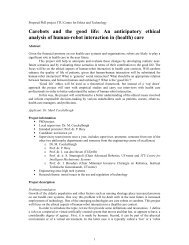Ethical issues in engineering design - 3TU.Centre for Ethics and ...
Ethical issues in engineering design - 3TU.Centre for Ethics and ...
Ethical issues in engineering design - 3TU.Centre for Ethics and ...
You also want an ePaper? Increase the reach of your titles
YUMPU automatically turns print PDFs into web optimized ePapers that Google loves.
<strong>Ethical</strong> <strong>issues</strong> <strong>in</strong> eng<strong>in</strong>eer<strong>in</strong>g <strong>design</strong><br />
The first problem with regard to acceptance is that it rema<strong>in</strong>s unclear <strong>in</strong><br />
Grunwald’s ideas how acceptance by actors has to be established. Can<br />
acceptance be assumed until actors actually state that they th<strong>in</strong>k that the<br />
framework is unacceptable? This might be very practical from the po<strong>in</strong>t of view<br />
of eng<strong>in</strong>eers <strong>and</strong> other people <strong>in</strong>volved <strong>in</strong> def<strong>in</strong><strong>in</strong>g the elements of the<br />
framework because they only need to be open to the signals of actors who do not<br />
accept the framework. Until the moment that there are these k<strong>in</strong>ds of signals<br />
eng<strong>in</strong>eers can use the regulative framework. An example of actors voic<strong>in</strong>g their<br />
objections about a regulative framework, taken from the media, was given <strong>in</strong> the<br />
pip<strong>in</strong>g <strong>and</strong> equipment case with respect to the regulative framework concern<strong>in</strong>g<br />
chemical <strong>in</strong>stallations. If the above assumption of acceptance should not be<br />
made then the people def<strong>in</strong><strong>in</strong>g a framework should seek active acceptance of any<br />
actors affected by a framework. This would require a change <strong>in</strong> the procedures<br />
used to def<strong>in</strong>e elements of a framework. A regulative framework <strong>in</strong> the EU partly<br />
consists of legislation that is <strong>for</strong>mulated <strong>and</strong> voted on with<strong>in</strong> the European<br />
Commission <strong>and</strong> European Parliament or national parliaments. People with<strong>in</strong><br />
society have, by vot<strong>in</strong>g <strong>for</strong> their representatives, a small <strong>and</strong> <strong>in</strong>direct <strong>in</strong>fluence on<br />
the legislation conta<strong>in</strong>ed <strong>in</strong> regulative frameworks. Other elements of the<br />
regulative framework like codes <strong>and</strong> st<strong>and</strong>ards are <strong>for</strong>mulated without any direct<br />
or <strong>in</strong>direct <strong>in</strong>fluence of the actors that might possibly be affected by the<br />
technology. In some countries there are special governmental agencies that<br />
<strong>for</strong>mulate technical codes. In other countries codes are <strong>for</strong>mulated by <strong>in</strong>dustrial<br />
organisations (see section 5.2.2). Ideas on the <strong>in</strong>terpretation of codes <strong>and</strong> good<br />
<strong>design</strong> practice are usually learned <strong>in</strong> practice or dur<strong>in</strong>g education, so these ideas<br />
may be harder <strong>for</strong> people outside eng<strong>in</strong>eer<strong>in</strong>g to <strong>in</strong>fluence. One way or another,<br />
active acceptance of the whole regulative framework by all possibly affected<br />
actors requires a different procedure <strong>for</strong> <strong>for</strong>mulat<strong>in</strong>g the elements of a regulative<br />
framework than used at present or an explicit step of accept<strong>in</strong>g the regulative<br />
framework after the <strong>for</strong>mulation of the framework.<br />
The second problem with regard to the requirement that a normative<br />
framework should be accepted is that a regulative or normative framework is not<br />
static. A framework will change over time so it is not enough to accept a<br />
framework once. If the active acceptance of all the actors <strong>in</strong>volved is required<br />
then this should lead to some k<strong>in</strong>d of cont<strong>in</strong>uous, active acceptance process. One<br />
way to assure the acceptance of cont<strong>in</strong>uously adapted <strong>and</strong> chang<strong>in</strong>g regulative<br />
frameworks is to implement a participatory process <strong>for</strong> <strong>for</strong>mulat<strong>in</strong>g <strong>and</strong><br />
adapt<strong>in</strong>g such frameworks. I will not go <strong>in</strong>to the problems of implement<strong>in</strong>g such<br />
an approach, or discuss the opportunities <strong>for</strong> <strong>in</strong>clud<strong>in</strong>g participatory methods<br />
used <strong>in</strong> technology development, but requir<strong>in</strong>g the active acceptance of<br />
regulative frameworks could result <strong>in</strong> some k<strong>in</strong>d of participatory process (<strong>for</strong><br />
178



